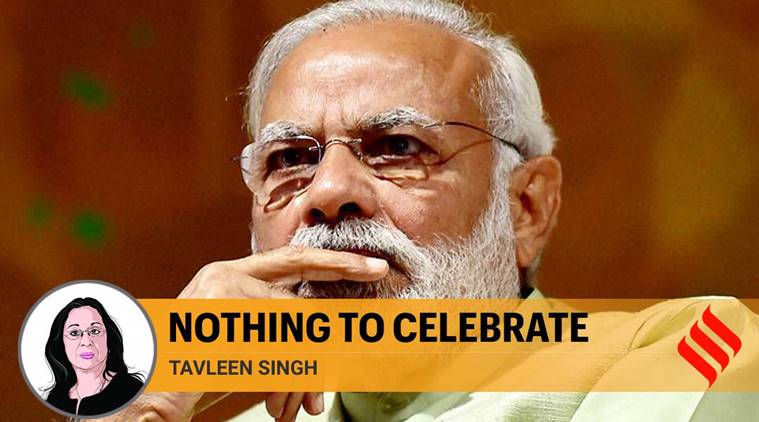 The pandemic gives PM Modi a second chance to achieve an old goal.
The pandemic gives PM Modi a second chance to achieve an old goal.
What a terrible year it has been for India. And, for Narendra Modi. Next week marks the end of the first year of his second term as Prime Minister, and it would be no exaggeration to say that it has been the worst year of his long political career. Try and think of one shining moment, one dazzling achievement and you will probably end up agreeing that there have not been any. Before sitting down to write this piece I tried to establish exactly when things started to go bad and came up with August last year, when Arun Jaitley died. Suddenly, the priorities and the image of the government changed dramatically.
From an agenda of economic priorities, we moved to an agenda that seemed designed to take India towards becoming a Hindu Rashtra. It did not take long for Muslims to notice that there was an exercise underway to make them acknowledge that their position in the ‘new India’ would be lower than that of Hindus. In August last year, the special status of our only Muslim-majority state was altered by the removal of Article 370. Jammu & Kashmir lost its status as a state and was broken into a divided Union territory. Jaitley was alive but his health was too poor for him to be able to offer advice or caution. If he had been able to, I believe that Kashmiris would not have been humiliated the way they have been.
As someone who has reported on our Kashmir problem for more than 40 years, I personally believe that Article 370 had to go, sooner rather than later, because it had given jihadist secessionists in the Valley the false hope that Kashmir will one day become an independent Islamic Republic. But, I would have been happier to see Article 370 removed with the support of political leaders in Kashmir who have been on India’s side. Instead, what Kashmir got was the jackboot and a brutal lockdown. The consequences have been awful. Omar Abdullah tweeted last week that Kashmir is now in a state of being in a lockdown within a lockdown. Jihadists continue to strike as much terror as they did before despite attempts to control them by imposing the longest Internet shutdown in history.
The man who initiated the passage in Parliament of the law to remove Article 370 was the Home Minister. And, it soon became clear that he was to replace Jaitley as the face of Modi’s government. Amit Shah has a natural belligerence that does not work well in public life, but it seemed to be part of the new image that the Prime Minister wanted to create for his second term. So, it was also left to the Home Minister to initiate the most controversial and discriminatory law that has ever been passed by India’s Parliament. The Citizenship Amendment Act (CAA).
Had this law not had a prelude in which the Home Minister wandered the land making speeches in which he used the word ‘termite’ to describe those Bangladeshi Muslims who have entered India illegally, CAA may have been less divisive. His use of this ugly word sent a message to Indian Muslims that they understood well. When they linked CAA to the Home Minister’s promise that it would be followed by an exercise to make a National Register of Citizens, Muslims understood that citizenship was being weaponized. Public protests followed, that culminated in Delhi exploding in a frenzy of communal violence even as the President of the United States was dining at a state banquet in Rashtrapati Bhawan.
By the time the pandemic arrived, communal tensions were so high that Bharatiya Janata Party spokesmen and social media trolls tried to blame the pandemic on Muslims. On top of this has come a humanitarian crisis that has shown the whole world that the majority of the Indian workforce is made of people so poor that they have been treated as if they were not human. It has also shown that the series of lockdowns we have been subjected to have been so badly planned that the purpose they were meant to serve has been defeated.
As the lockdowns begin to be lifted, they will reveal an economic crisis of grim proportions. If the poorest of our citizens have suffered the most, the richest have also seen their businesses badly damaged. Those in the middle, who survive from what they can earn from small businesses and from jobs in various service industries, have been reduced to a state of penury. The Prime Minister tried in his latest address to the nation to revive the dream of the 21st century being India’s century and promised reforms that would make this dream a reality.
The pandemic gives him a second chance to achieve this old goal. But, he must return to the road that leads to ‘parivartan’ and ‘vikas’. The road he has taken in this first year of his second term will lead not to a Hindu Rashtra, as most of his supporters on social media believe, but to more hatred and violence. When the lockdowns are lifted, we are likely to discover a country with a broken economy and a political atmosphere so poisoned that it could be as lethal as Covid-19.
There really is very little to celebrate on this anniversary of the first year of Narendra Modi’s second term in office.